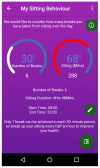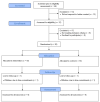Randomised Controlled Feasibility Study of the MyHealthAvatar-Diabetes Smartphone App for Reducing Prolonged Sitting Time in Type 2 Diabetes Mellitus
- PMID: 32575482
- PMCID: PMC7345154
- DOI: 10.3390/ijerph17124414
Randomised Controlled Feasibility Study of the MyHealthAvatar-Diabetes Smartphone App for Reducing Prolonged Sitting Time in Type 2 Diabetes Mellitus
Abstract
This study evaluated the feasibility and acceptability of a self-regulation smartphone app for reducing prolonged sitting in people with Type 2 diabetes mellitus (T2DM). This was a two-arm, randomised, controlled feasibility trial. The intervention group used the MyHealthAvatar-Diabetes smartphone app for 8 weeks. The app uses a number of behaviour change techniques aimed at reducing and breaking up sitting time. Eligibility, recruitment, retention, and completion rates for the outcomes (sitting, standing, stepping, and health-related measures) assessed trial feasibility. Interviews with participants explored intervention acceptability. Participants with T2DM were randomised to the control (n = 10) and intervention groups (n = 10). Recruitment and retention rates were 71% and 90%, respectively. The remaining participants provided 100% of data for the study measures. The MyHealthAvatar-Diabetes app was viewed as acceptable for reducing and breaking up sitting time. There were preliminary improvements in the number of breaks in sitting per day, body fat %, glucose tolerance, attitude, intention, planning, wellbeing, and positive and negative affect in favour of the intervention group. In conclusion, the findings indicate that it would be feasible to deliver and evaluate the efficacy of the MyHealthAvatar-Diabetes app for breaking up sitting time and improving health outcomes in a full trial.
Keywords: behaviour change; glucose; health apps; health coaching; sedentary behaviour; theory of planned behaviour.
Conflict of interest statement
The authors declare no conflict of interest.
Figures
References
-
- Ogurtsova K., da Rocha Fernandes J.D., Huang Y., Linnenkamp U., Guariguata L., Cho N.H., Cavan D., Shaw J.E., Makaroff L.E. IDF Diabetes Atlas: Global estimates for the prevalence of diabetes for 2015 and 2040. Diabetes Res. Clin. Pract. 2017;128:40–50. doi: 10.1016/j.diabres.2017.03.024. - DOI - PubMed
-
- Borg R., Kuenen J.C., Carstensen B., Zheng H., Nathan D.M., Heine R.J., Nerup J., Borch-Johnsen K., Witte D.R. HbA(1)(c) and mean blood glucose show stronger associations with cardiovascular disease risk factors than do postprandial glycaemia or glucose variability in persons with diabetes: The A1C-Derived Average Glucose (ADAG) study. Diabetologia. 2011;54:69–72. doi: 10.1007/s00125-010-1918-2. - DOI - PMC - PubMed
-
- Wilmot E.G., Edwardson C.L., Achana F.A., Davies M.J., Gorely T., Gray L.J., Khunti K., Yates T., Biddle S.J.H. Sedentary time in adults and the association with diabetes, cardiovascular disease and death: Systematic review and meta-analysis. Diabetologia. 2012;55:2895–2905. doi: 10.1007/s00125-012-2677-z. - DOI - PubMed
Publication types
MeSH terms
LinkOut - more resources
Full Text Sources
Medical



